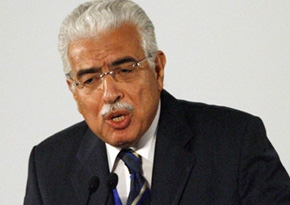
Egyptian Prime Minister Ahmed Nazif said on Monday that the Nile Basin countries are agreed that Egypt's water quota should remain intact
However, he recognized at a joint news conference with visiting Kenyan Prime Minister Raila Odinga that there is a difference over an item of a framework agreement recently signed by four Nile Basin countries in Uganda.
Nazif added that the leaders of all those countries had affirmed to Egypt that they would never take any action that could negatively impact on its Nile water quota.
He emphasized that any future projects on the Nile should be negotiated by all the Nile Basin nations.
However, the Egyptian premier vowed that his country would continue efforts to push forward development cooperation with those countries, and spur Egyptian companies to invest on their soils.
For his part, the Kenyan prime minister said the recently signed framework agreement would not negatively affect Egypt's water rights, and that a controversial item of the deal would be reconsidered.
But, he denied any foreign pressure for fomenting tensions between Kuwait and Nile Basin nations, recalling to memory that Egypt is a member of the African Union and Common Market for Eastern and Southern Africa (COMESA).
He reiterated that relations among them are based on joint cooperation for the common interest of all parties.
Despite strong Egyptian and Sudanese opposition, Tanzania, Uganda, Rwanda and Ethiopia have recently signed a new water-sharing agreement.
The other three countries, Kenya, Burundi and the Democratic Republic of Congo said they would follow suit within the next 12 months.
Egyptian Prime Minister Ahmed Nazif said on Monday that the Nile Basin countries are agreed that Egypt's water quota should remain intact
However, he recognized at a joint news conference with visiting Kenyan Prime Minister Raila Odinga that there is a difference over an item of a framework agreement recently signed by four Nile Basin countries in Uganda.
Nazif added that the leaders of all those countries had affirmed to Egypt that they would never take any action that could negatively impact on its Nile water quota.
He emphasized that any future projects on the Nile should be negotiated by all the Nile Basin nations.
However, the Egyptian premier vowed that his country would continue efforts to push forward development cooperation with those countries, and spur Egyptian companies to invest on their soils.
For his part, the Kenyan prime minister said the recently signed framework agreement would not negatively affect Egypt's water rights, and that a controversial item of the deal would be reconsidered.
But, he denied any foreign pressure for fomenting tensions between Kuwait and Nile Basin nations, recalling to memory that Egypt is a member of the African Union and Common Market for Eastern and Southern Africa (COMESA).
He reiterated that relations among them are based on joint cooperation for the common interest of all parties.
Despite strong Egyptian and Sudanese opposition, Tanzania, Uganda, Rwanda and Ethiopia have recently signed a new water-sharing agreement.
The other three countries, Kenya, Burundi and the Democratic Republic of Congo said they would follow suit within the next 12 months.
Cairo refused to sign onto any convention without assurances by other members that the country would not lose the 55.5 billion cubic meters of Nile water they are allowed to use and demanded a veto power over any projects implemented upstream in southern Nile nations.
The quantity of rain water received by the upstream countries hits 1.8 billion cubic meters and that the quota of downstream countries (Egypt and Sudan) hits 73 billion cubic meters annually, 55 billion of which goes to Egypt and 18 billion goes to Sudan.
Cairo refused to sign onto any convention without assurances by other members that the country would not lose the 55.5 billion cubic meters of Nile water they are allowed to use and demanded a veto power over any projects implemented upstream in southern Nile nations.
The quantity of rain water received by the upstream countries hits 1.8 billion cubic meters and that the quota of downstream countries (Egypt and Sudan) hits 73 billion cubic meters annually, 55 billion of which goes to Egypt and 18 billion goes to Sudan.
 Egyptian Prime Minister Ahmed Nazif said on Monday that the Nile Basin countries are agreed that Egypt's water quota should remain intact
Egyptian Prime Minister Ahmed Nazif said on Monday that the Nile Basin countries are agreed that Egypt's water quota should remain intact


